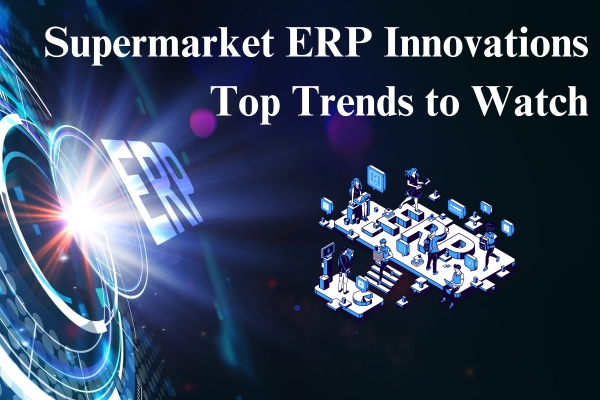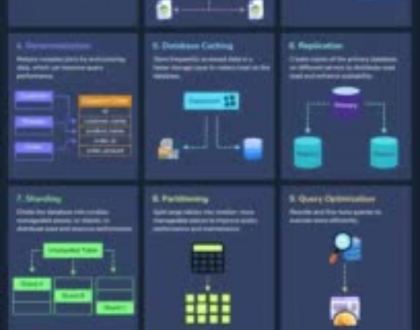Supermarket ERP Innovations: Top Trends to Watch

May 23, 2024
The retail industry is rapidly evolving, and supermarkets are at the forefront of adopting innovative technologies to streamline operations and enhance customer experiences. Enterprise Resource Planning (ERP) systems play a crucial role in this transformation, providing comprehensive solutions that integrate various aspects of supermarket operations. In this blog post, we will explore the top trends in supermarket ERP innovations that are shaping the future of the retail industry.
Understanding Supermarket ERP Systems
An overview of what ERP systems are and their significance in the supermarket industry.
Supermarket ERP systems are integrated software solutions that manage and automate various business processes, including inventory management, sales, finance, supply chain, and customer relations. These systems provide a centralized platform for real-time data access and decision-making, enhancing operational efficiency and reducing costs.
The Rise of AI and Machine Learning in ERP
How artificial intelligence and machine learning are revolutionizing supermarket ERP systems.
Predictive Analytics
AI and machine learning enable predictive analytics, helping supermarkets forecast demand, optimize inventory levels, and reduce wastage.
Automation
Automation of routine tasks such as restocking, order processing, and customer service enhances efficiency and reduces human error.
Personalization
Machine learning algorithms analyze customer data to provide personalized recommendations and promotions, improving customer satisfaction.
Cloud-Based ERP Solutions

The benefits and trends of adopting cloud-based ERP solutions in supermarkets.
Scalability
Cloud-based ERPs offer scalability, allowing supermarkets to expand their operations without significant upfront investments in IT infrastructure.
Accessibility
With cloud ERP, employees can access data and perform tasks from anywhere, facilitating remote work and improving flexibility.
Cost-Effectiveness
Cloud solutions reduce the need for on-premises hardware and maintenance, leading to cost savings.
Mobile ERP Applications
The impact of mobile ERP applications on supermarket operations.
Real-Time Data Access
Mobile ERP apps provide real-time access to crucial business data, enabling managers to make informed decisions on the go.
Enhanced Communication
Improved communication between staff members through mobile apps leads to better coordination and faster problem resolution.
Increased Productivity
Mobile solutions streamline tasks such as inventory checks and order processing, boosting overall productivity.
IoT Integration in Supermarket ERP
Exploring the integration of Internet of Things (IoT) technology with ERP systems in supermarkets.
Smart Shelves
IoT-enabled smart shelves monitor inventory levels in real-time, sending alerts when restocking is needed.
Energy Management
IoT devices track and optimize energy usage in supermarkets, reducing costs and supporting sustainability efforts.
Asset Tracking
IoT sensors track the location and condition of assets such as shopping carts and refrigeration units, ensuring efficient operations.
Advanced Data Analytics and Business Intelligence
The role of advanced data analytics and business intelligence in modern supermarket ERP systems.
Data-Driven Decisions
Advanced analytics tools provide insights into customer behavior, sales trends, and operational performance, aiding strategic decision-making.
Custom Reports
Business intelligence features allow supermarkets to generate custom reports and dashboards, enhancing visibility into key metrics.
Competitive Advantage
Leveraging data analytics helps supermarkets stay ahead of competitors by identifying opportunities and addressing challenges promptly.
Omni-Channel Retailing and ERP
How ERP systems support omni-channel retailing strategies in supermarkets.
Integrated Sales Channels
ERP systems integrate online and offline sales channels, providing a seamless shopping experience for customers.
Unified Inventory Management
Unified inventory management ensures accurate stock levels across all channels, reducing stockouts and overstock situations.
Consistent Customer Experience
ERP-enabled omni-channel strategies ensure a consistent and cohesive customer experience, regardless of the shopping platform.
Personalization and Customer Experience
Enhancing customer experience through personalized services enabled by ERP systems.
Personalized Promotions
ERP systems analyze customer purchase history to create personalized promotions and offers, increasing engagement and loyalty.
Customer Profiles
Detailed customer profiles stored in the ERP system allow for targeted marketing and improved service delivery.
Feedback Management
ERPs facilitate the collection and analysis of customer feedback, helping supermarkets address issues and improve service quality.
Enhanced Inventory Management
Innovations in inventory management through ERP systems.
Real-Time Tracking
Real-time inventory tracking ensures accurate stock levels and reduces the risk of stockouts.
Automated Reordering
Automated reordering processes based on predefined thresholds help maintain optimal inventory levels.
Supplier Integration
ERP systems integrate with suppliers to streamline procurement and manage supply chain disruptions effectively.
Sustainability and Green ERP Practices
How ERP systems support sustainability initiatives in supermarkets.
Energy Efficiency
ERP systems monitor and optimize energy consumption, reducing the supermarket’s carbon footprint.
Waste Reduction
Innovative inventory management and predictive analytics help minimize food waste.
Sustainable Sourcing
ERPs track and manage sustainable sourcing practices, ensuring compliance with environmental regulations.
Conclusion
Intertoons leads the way in integrating advanced ERP innovations for supermarkets .Supermarket ERP innovations are transforming the retail industry by enhancing operational efficiency, improving customer experiences, and supporting sustainability efforts. By staying abreast of these trends, supermarkets can leverage technology to stay competitive and meet the evolving needs of their customers.
FAQ – Supermarket ERP Innovations
Q: What is a supermarket ERP system?
A: A supermarket ERP system is an integrated software solution that manages various business processes such as inventory, sales, finance, supply chain, and customer relations.
Q: How does AI improve supermarket ERP systems?
A: AI enhances supermarket ERP systems by enabling predictive analytics, automating routine tasks, and providing personalized customer experiences.
Q: What are the benefits of cloud-based ERP solutions?
A: Cloud-based ERP solutions offer scalability, accessibility, and cost-effectiveness by reducing the need for on-premises hardware and maintenance.
Q: How do IoT devices integrate with supermarket ERP systems?
A: IoT devices integrate with supermarket ERP systems to monitor inventory levels, manage energy usage, and track assets in real-time.
Q: What role does data analytics play in supermarket ERP systems?
A: Data analytics provides insights into customer behavior, sales trends, and operational performance, aiding strategic decision-making and enhancing competitiveness.
By embracing these innovative trends in supermarket ERP systems, businesses can optimize their operations, reduce costs, and deliver superior customer experiences.
Recommended Posts

12 Proven Ways to Improve Database Performance
April 29, 2025


